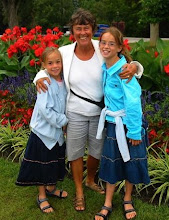The novel is a fictionalized autobiographical account of a Canadian woman, born in Germany. It shows Bettina’s struggle to come to terms with the complexities of Germany’s problematic past. Bettina was born in Germany in 1946, but as a young woman left her country of origin to live in North America, first in the U.S. then in Canada. She married an American man of Jewish origin. Her physical distance from her native country as well as her older son’s increasingly Jewish identity and growing awareness of Germany’s devastating history of the Third Reich, have added to her own strong ambivalence towards her native land.
In December 1989, a month after the opening of the Berlin Wall, Bettina travels back
to Germany, accompanied by her three children: Leon (12), Jonathan (9), and Jessica (6).
This proves to be a journey of psychological and emotional intensity. With the Berlin Wall
crumbling, Bettina senses a possibility for other “walls” to come down, walls not too securely
erected in the psyches of the German people during the early post war period. They had been
erected to block from view the suffering inflicted by the Nazis .The novel examines the
traumata experienced by some ordinary Germans and culminates in the focus on the Jewish
victims of the Holocaust and the struggle of individual Germans with the more than shameful past of their country...
Significant memories from her early childhood, triggered by events immediately following the collapse of the Berlin Wall, are resurrected. They include encounters with a kaleidoscope of characters: an emotionally destroyed German war veteran suffering from post-traumatic stress; a housekeeper who lost several brothers in the war and is convinced Hitler is still alive; a woman who, confused by the conflicting ideologies at home and in public life, has turned to prostitution; and another woman who had been driven to infanticide. The reader is witness to Bettina’s emotional upheaval after a beloved father figure from her childhood is exposed as a former SS officer. The reader witnesses her moving encounter with a young Jewish girl who reluctantly lives in Germany. Brought back to life are the stories of a young German boy whose longing to re-unite with his veteran Afro-American father has tragic consequences, and of Bettina’s own grandmother, who in her Alzheimer dementia, believes a soccer game to be a Nazi assembly. Finally, we meet Bettina’s history teacher who is tormented by the fact that she has to teach year after year about the Nazi regime of which she was a willing and naïve supporter.
These characters and their stories together exemplify the confusion, crushed hopes and stripped illusions, the sufferings and wrongdoings, the denial and insights of those whose life was forever shaped by the Nazi experience – of all those human beings who lived in the Third Reich, some in the limelight and some in its deep shadows.
The child Bettina used to dig in the rubble for remnants and “…treasures mostly broken. It was almost impossible to find anything undamaged.” The adult Bettina digs deeper and deeper in the rubble of memories. She initially confronts the people only in her mind, in internal dialogues, the “safer” way of exploring. She then realizes she has to take on the risk of confronting real-life individuals, often prompted by her son’s probing questions.
As confrontations mount, there arises the dilemma of one who feels compelled to scrutinize and therefore hurt those who have never personally caused her any harm. Hers are the dilemmas and scruples of one who “didn’t live through it all,” but is nevertheless deeply affected by the fallout. Though not personally responsible for what happened, she feels a responsibility to expose, to tear down walls or at least poke holes into them. She struggles with her right to expose tragic flaws that led to the communal failure of a people – including her parents, who had raised her with love and care.
Bettina comes to understand that the driving forces which enable human beings to surpass limitations and limits, and give them wings to fly, can also, as with the Germans of the Third Reich, deliver us to evil and rob us of our humanity. She, the native German, reaches for her share, not of communal guilt but of communal shame. She embraces the responsibilities that arise from this. She comes to realize that her strong ambivalence towards her country of origin is not something to suppress or overcome, but to acknowledge and accept. For Bettina, this is not merely a desirable option but the only one that is emotionally and morally possible.
Annette Weisberg
( If you are interested in obtaining a copy of this novel, please contact me at: weisbergann@hotmail.com)
Subscribe to:
Post Comments (Atom)

Annette is telling a story about Germany and its citizens before, during and after the Second World War. Reading her book has taught me a lesson in history which I never heard before. I was born in Israel, a third generation after the holocaust, and always thought about those times from a Jewish perspective. We, my family, the Jewish people were the victims; probably the only ones in my thoughts. I am pleased that I had the chance to hear that side about the history of the human kind. I would like to thank you Annette, for opening a window into part of your complex and fascinating life.
ReplyDeleteI am anxious to read this novel. Your perspective seems exceptionally unique. So often we dismiss "the Germans" (as my father, a WWII vetran, would say) as being all the same and think, sometimes, of our cinematic experiences, where all Germans were Nazis (even Speilberg, in Schindler's List, makes Schindler the exception to everyone else).
ReplyDeleteIf the novel is as well crafted as your stories are, I am sure that I am in for a great read. Where can I obtain this book?
David